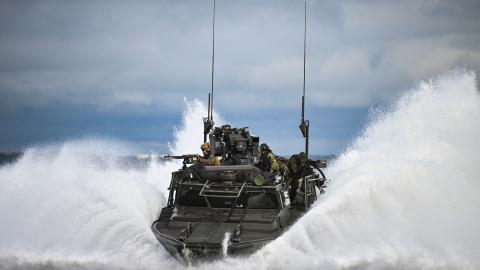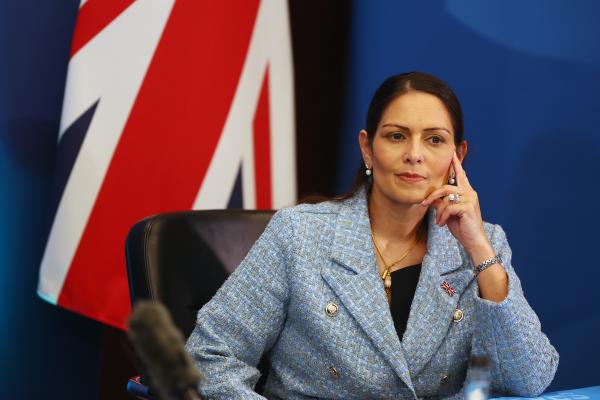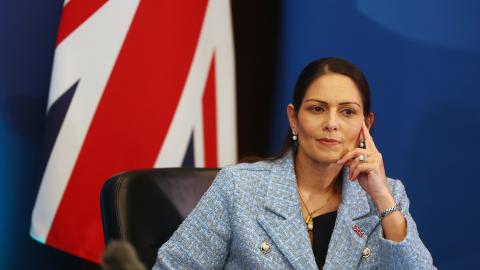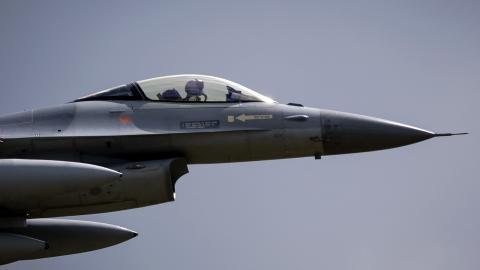
How Civil Defense Boosts Deterrence: A View from Sweden


Minister for Civil Defense, Swedish Ministry of Defense

Senior Fellow and Director, Center on Europe and Eurasia
Peter Rough is a senior fellow and director of the Center on Europe and Eurasia at Hudson Institute.

Senior Fellow, Center on Europe and Eurasia
Daniel Kochis is a senior fellow in the Center on Europe and Eurasia at Hudson Institute.
Sweden’s total defense concept includes a civil defense component that “encompasses the whole of society and comprises the collective resilience in the event of war or danger of war.” Civil defense consists of three pillars: defending the population, safeguarding important societal functions, and contributing to the armed forces’ ability to respond to an attack. Russia’s hybrid attacks against the West and indiscriminate targeting of civilians in Ukraine have underscored the importance of a robust civil defense.
How can Stockholm’s new North Atlantic Treaty Organization allies learn from Sweden’s civil defense experience to harden the vulnerable elements of Western societies? How does Sweden employ a whole-of-society approach to strengthen its total defense? What has Sweden learned from the war in Ukraine, and how can this enhance its civil defense capabilities? What is the Swedish view of the geopolitical situation in Europe and beyond?
Join Hudson for a discussion with Swedish Minister for Civil Defense Carl-Oskar Bohlin on the Swedish approach to civil defense.
Event Transcript
This transcription is automatically generated and edited lightly for accuracy. Please excuse any errors.
Peter Rough:
Well now it is officially good afternoon, everyone. Good evening if you’re following us on a live stream at home or pulling us up on our various social media feeds. It’s a real pleasure to have you all with us today. My name is Peter Rough. I’m a senior fellow here at Hudson and director of our Center on Europe and Eurasia. And it’s a thrill to do this introduction for several reasons. The first is that it’s not often that we are able and lucky enough to welcome into our premises the newest treaty ally of the United States, in this case, the Kingdom of Sweden. So welcome treaty ally to the United States to Hudson Institute. It’s a real thrill to have you here. It’s also my pleasure to introduce a special member of the Kingdom of Sweden’s government, and that is Minister Carl-Oskar Bohlin, who is the Swedish Minister for Civil Defense.
He served in that position under the Prime Minister Ulf Kristersson since 2022, an auspicious state in Europe or an auspicious year in Europe owing to the full scale invasion, of course, of Ukraine. And it’s the first time that that position has been in existence since the Second World War. It covers and spans all 10 sectors of society. Also, I think with a tip of the hat to modern security challenges, cybersecurity and disinformation. And prior to taking on that role, the minister was a member of Parliament for a dozen years in Stockholm. The other reason why this is a special treat for me today is that Hudson actually has a long and venerable history of focusing on civil defense. And in fact, I pulled up here from July 1958, our founder, Herman Kahn, prior to coming and founding Hudson Institute in New York State, serving at the Rand Corporation, a report on a study of non-military defense, which was, in the 1950s, a way of saying a civil defense.
The report focused on alleviating the catastrophe of a nuclear attack, God forbid, but also how civil defense might increase US freedom of action in conducting peacetime foreign policy and implementing a broad deterrence strategy. “General war may occur,” Herman Kahn wrote along with his co-authors, “And it would be irresponsible to throw up our hands about the post-war world.” Well, general war is occurring today in Europe, so this position is as important as ever.
The third and final reason why I’m delighted to do this introduction is to brag a little bit on my colleague, Dan Kochis. He’s the newest member of Hudson’s Europe operation here. We’re proud to be investing in Europe work at a time when other organizations are not. We think it’s vitally important for the United States and for our national interests. Dan is really an expert, one of Washington’s leading intellectuals on all things related to Northern Europe. Hudson recently has really done more work on Northern European security, and rather than to use a phrase from another part of Europe, Balkanizing the continent into the Baltics, the Nordics, the Arctic region, we’re really trying to take a comprehensive view. And for that reason, I’m thrilled that Dan was willing and available to host this conversation today. So with that, again, thank you all for being here. Enjoy the sandwiches For those of you at home, there’s no sandwiches for you, but a rich intellectual feast that’s about to unfold. Dan Kochis, the floor is yours.
Daniel Kochis:
Thank you, Peter, for that very kind introduction and thank you to all of you who are here today and aligned. And thank you, most importantly, to you, Mr. Minister, for being here. We’re really delighted to hear you share your wisdom and thoughts on a topic which a lot of countries, including the United States are really very far behind. As Peter mentioned, you’re the first Swedish minister of civil defense since the late 1940s. And so that, in many ways, is really a stark reminder, I think, of the changes that we’ve seen over the past decade in the transatlantic security sphere. So perhaps maybe, just to sort of whet our appetite, if you could give us some of your thoughts on what you’ve been able to accomplish since you’ve been appointed into this role and where you’d like to see the pathways moving forward.
Carl-Oskar Bohlin:
So, first of all, thank you so much for having me. It’s an honor to be here. And so this is obviously something that is happening to the backdrop of what is unfolding in Europe right now. The first large-scale war since the end of the second World War on the European continent. And the way this government sees it is that civil defense is an integral part of creating a modern and prominent defense posture. It’s a part of our deterrence for what Russia is undertaking right now, and I think that there has been a number of showcases on how important it is in today’s world to build a resilient and robust society in order to create credible deterrence, because there is no chain that is stronger than its weakest links. And in the wake of the launch of the full-scale invasion, it became very apparent for many European countries on how vulnerable their civil part of their society were towards cyber attacks, towards energy dependencies.
And that robustness in many of the European societies were not as prominent and as good as we would like them to be. And the Swedish takeaway from this is that we are now re-establishing the Swedish total defense concept, basically encompassing all 10 million citizen, every municipal board, every regional board, every agency have a role to play in the Swedish total defense effort. And that stretches all the way from making individuals more prepared for handling the consequences of an armed attack, resting on the basic assumption that every Swede is actually required by law to partake in the Swedish total defense effort. And in order to do that, you need to be able to fend for yourself. You need to be able to have a better home preparedness. But it also goes for agencies, for regional bodies, for municipalities to be able to handle disturbed circumstances in order, not only to secure that basic societal functions can keep functioning, but also to provide support for the military defense in order for the military defense to be able to fulfill its task during an armed attack.
And I think if there’s one key takeaway from, there are many key takeaways, of course, from what we’re seeing now unfolding in Ukraine, it is that Ukraine, in between the period of 2014, the first annexation of Crimea and the eastern part of Ukraine, when the war originated, they managed to become much more ready. They built a robust and resilient society up until the start of the full scale invasion. And that, I would say, played a large part in the X factor in this war that many people did not foresee. I mean, of course, the ardent support from Western countries with the military platform, of course, is pivotal. But I think, on the other hand, just as important, the Ukrainian will to resist and the Ukrainian ability to have built a society that in its basic functions have withstood the Russian attempts to sort of break the backbone of the Ukrainian society.
And I say that has been instrumental also in order to maintain the will to fight, the will to defend the country in Ukraine, and I think that the stark message to the rest of Europe, which was also delivered by President Zelensky at the Munich Conference, is that you will now have to get ready for this. Even though it’s much more convenient to focus on other things, you’ll have to do your homework, because we were not ready in 2014, but we were forced to be ready in 2022, and that has, to a large part, led to the Ukrainian success thus far.
And I think that that was a huge strategic mistake from Vladimir Putin not taking this factor into consideration. And it’s obvious that he’s now betting on the lack of Western unity. And it is our common goal to show that he’s wrong in that assumption, as well. And that is one part that brings us here, of course, to underscore the importance of the transatlantic link, but also to show that what Sweden is now doing is taking its part of burden sharing in ramping up spending on military defense, but also spending large amounts on building up the civil defense as an integral part of our total defense concept.
Daniel Kochis:
Well, thank you for those opening thoughts. There’s a lot of strands I think that we can unpack there, but maybe one area to start. In 2022, Sweden Inaugurated a Psychological Defense Agency, which was really a return to sort of a Cold War Swedish understanding of psychological preparedness as one of the key pillars of total defense. Can you speak a bit to the Swedish approach to psychological defense within society? Specifically that you highlighted recently in a talk in the Summer for Democracy and march about a proactive approach on this topic?
Carl-Oskar Bohlin:
Well, I think that the recent decade have shown us the importance of western democracies. Western societies need to have the ability to handle and combat malign influential campaigns, because that is something that is being targeted against us to a large and large extent. We could see that in Sweden during our NATO recession process where we had, for example, Quran burnings in the Swedish society that was portrayed by malign state actors in a way that were not true in order to harm the process and harm the Swedish Society and sow division in society.
So, since 2022, we have the, as you mentioned, the agency for Psychological Defense. And what they’re doing is basically providing the tools bodies within the Swedish society to better handle and to counter counteract malign influential campaigns and disinformation campaigns. But, I think, also, in the bottom of this, it comes down to information literacy and media literacy. And this shows us, also, that this counter effort that we need to put in can’t be done without involving media literacy, for example, in the curriculum and working with the whole of a society approach to address this question because there is no sign that this is going away anytime soon.
Daniel Kochis:
Thank you. One area that I think about in terms of Sweden that is so different now from the Cold War is this societal makeup. So can you talk about efforts that you’re undertaking that the government is undertaking to try to prepare newer immigrants to Sweden to take part in total defense and any challenges that you have in that particular sphere?
Carl-Oskar Bohlin:
So in Sweden, we, in general, see a very high will to defend, and that is, of course, one of our most important assets. I would say it’s an important foundational asset for every country in order to sustain an antagonist in the entirety of the threat scale, namely the fact that your citizens is willing to defend your country. And this is, of course, being challenged from a number of factors, but Sweden is no exception in terms that we’re seeing more division taking place within the Swedish society. But I think that what we are building upon is there is a generally high trust in institutions in Sweden. And our mission here is, of course, to making sure that people have come to Sweden, understands that institutions in Sweden is not there to harm them. Maybe that has been a previous experience from countries that they’ve come from.
But I think it’s also equally important to underline that, with the Swedish citizenship, comes also our obligations. There is not only rights connected to the Swedish citizenship, but we need to underline the obligations. And I think that is something that if we’re going to be self-critical, that we might have neglected in the past where there’s been more focus on the rights coming with the Swedish citizenship rather than the obligation that follows it. And I think it’s more important to underscore, also, the obligations side of the citizenship in the light of the fact that these obligations will manifest very much clearly in the event that Sweden finds itself or that an ally is involved in the event of an armed attack and that we need to fend off an antagonist, then that would put a much larger request on the individual citizen.
Daniel Kochis:
One of the aspects when we’re talking about sort of psychological preparedness is the Swedish government, I think, in 2018 began putting out brochures which talked about being prepared for war, talked about this duty, what you can do as a citizen of Sweden. I think about these going out in the United States, in a lot of ways, they would sort of, I think, elicit mass panic. But in Sweden, it seems that, by and large, they’ve been seen more as reassuring that the government is planning for this, that there are procedures in place. Can you talk about how this sort of preparedness, in terms of the government being out front and talking about these issues, how that’s impacted the society, how they’ve reacted, any lessons that you might have for the United States in terms of talking to their citizens about being prepared for total defense?
Carl-Oskar Bohlin:
Well, I think that, of course, every country has its own dynamic around these questions, but this is a shift that has been taking place gradually. We first sent out this brochure that you are referring to back in twenty-eighteen, six years ago. And there was a certain amount of debate regarding that, because then it had not been published since the midst of the Cold War, basically. There have been during the peace dividend, this brochure was not published.
But I mean, people are seeing the way that the security situation in our vicinity is deteriorating, and I think that the most fair thing a government can do in such a situation is to call us paid as paid. So describing the situation the way we are viewing upon it, and the Swedish Defense Commission has, with the unity of all our eight parties in the Swedish Parliament, said that this is the most dire security situation that Sweden has met since the end of the second World War. And we see it as a part of this is, of course, this is strategic communication, because in order to be prepared and be ready, you need to be sort of mentally on the same place where you see the world for what it is.
And so, that is what we are trying to come across with describing the security situation the way it is. And I think that the reception of this within the Swedish public, even though the message is sincere and stark, the response has been positive, because I think there is also sort of a demand for politicians describing things, not in rosy words, but for what the situation really looks like.
Daniel Kochis:
I think, in January, you talked about the thing that really keeps you up at night is this idea that, in Sweden, things are not moving quickly enough. So this is a component of, of course, talking to the public, but the other component is moving the mechanisms, the machinery of government to instill this sense of urgency. How has your experience been in your time as minister, and where do you see areas for improvement in terms of getting the government to be moving a bit more robustly and quicker on these issues of total defense?
Carl-Oskar Bohlin:
So, this is a very interesting thing that you bring up, because this is also, of course, a part of the strategic communication that I think is an absolute necessity to get this sort of oil tanker to turn around. Because civil defense, as a part of the total defense, is basically all of society. So if we put two and a half percent of our GDP on the military defense, the remaining 97.5 is a civil defense with of course a much larger plurality of actors, sorry.
And that also leads to the fact that there will not be as straight chain of command to the civil defense, and that makes strategic communication much more important so that every actor within the civil defense knows that we have to start digging where we stand and not waiting for others, not waiting for the perfect system to materialize. Because we must realize that time is a cost. Time is a factor in a way that it haven’t been in during the nineties and the early two thousands, because the threat was not as imminent as it might be today. Or we don’t know what the security situation looks like in three years or in five years. And that needs the realization that you factor time as a cost.
So, what we’ve done in the government, on the side from instituating this ministerial portfolio is making sure that we have deliverables along the way so that we see that the capability is increasing in a linear way. So we’ve put a lot of things in a sort of a fast track. We have reactivated, during the last year, we’ve reactivated civilian conscription for rescue services. We have put forward a refurbishment program for our protected shelters. Sweden has one of the highest amounts of protected shelters in the whole of Europe, but the standard and the maintenance level of these protected shelters is very low because they’ve not been attended to for 20 or 30 years. In a good way, we’re looking into fast track missions to ramp up our security of supply, even though that is a huge undertaking, we are putting forward deliverables that makes our capability increase, also, in the near future.
Daniel Kochis:
Well, you’ve hit on a number of areas that I wanted to discuss with you today, just a public service announcement and a few questions I’ll be going to the audience and see if you have any areas that you’d like to raise. So please start thinking of your questions, now. You mentioned the shelters. I’ve seen pictures of the finished shelters where you have these sort of hockey facilities underground, look beautiful. Sweden, the government is looking to put a lot of money in the new budget into refurbishing shelters. Are you prioritizing certain areas of the country? You’re prioritizing refurbishment of shelters within existing buildings or new shelters? How do you see that in your thinking?
Carl-Oskar Bohlin:
So the money we put forward is refurbishing existing shelters. So we basically have room for 7 million people in our shelters. And our population is totaling 10 million. And, I mean, is not reasonable to believe that Sweden would come under an attack at all of our territory at the same time. So protective shelter is only one measurement to be taking eviction of people can be one thing. And we’re also putting more resource sources into our rescue services to be able, and that is a direct experience from learning from what happened in Ukraine, seeing the rescue services being put under an enormous stress and an enormous workload where they have more to do within their regular duties. But also additional duties in handling demolished buildings, handling unexploded munitions, and also taking height for handling CBRN threats, which has not been what the rescue services in Sweden the last 20 or 30 years has been dimensioned for, but what we’re now, once again, putting money and effort to making them more ready to handle such threats.
Daniel Kochis:
Thank you. And just a little while ago you mentioned security of supply. So clearly, Russia has been the animating factor here from 2014 and it’s really reached a crescendo in 2022. But in between that there was also the pandemic. So can you talk a bit about how the pandemic experience of supply security or lack thereof that we all experienced impacted the way that Sweden is thinking about total defense in that capacity?
Carl-Oskar Bohlin:
So, I sometimes say that the first victim of the pandemic was the just in time society, because it showed us, in a very stark way, how vulnerable the modern society was to supply chain disruption, but also, to the lack of stockpiling of critical necessities in, for example, the healthcare sector. And I think that it was not only Sweden who experienced that, firsthand. A lot of the world and the whole world had a skyrocketing demand for the same products at the same time. So this shows us the importance of addressing the security of supply issues in a number of ways, which we are now trying to do where we have since the pandemic been ramping up stockpiling in the healthcare sector. We’re nowhere near done yet, but we have started that work. But it is also overseeing vulnerabilities in supply chains, critical dependencies, and I’ll be glad to elaborate around that a bit more, but also, the ability to facilitate product production redistribution.
Because what we saw in Sweden, for example, during the pandemic, is a significant part of our industrial base were willing to sort of redistribute their production and start producing other things to help grappling with the demands that were surging during the pandemics. But the public society were not suited to facilitate that in an expedient manner. And time in this situation costs human lives, basically. So what we are facilitating right now is a national function for handling these type of issues to be able to better facilitate production redistribution and production readjustment.
And in terms of critical dependencies, I think this is an area where Sweden should work alongside with its allied partners, because we all find ourselves in basically the same situation where we have a lot of critical dependencies from countries which we don’t want to be critically dependent on because we sometimes view them as antagonists or potential antagonists in the event of an escalated yield political situation. And in this regard, Sweden I would say has a lot to bring to the table. We are having supplies of 17, I think, of the 30 listed in EU listed critical rare Earth minerals and metals. We have huge supplies of phosphorous sitting in the ground, whereas Europe is, right now, finding itself critically dependent on fertilizers coming from Russia still, today. And I think that is a problem that needs to be addressed among partners, and I think that Sweden, in that regards, has really something to bring to the table, potentially.
Daniel Kochis:
Thank you. I know the rare Earth find last year, of course, there’s high hopes for when that is able to come online in a decade or so. What could that could do in terms of critical dependencies and lessening those of the Western allies? One area, I think about World War II when they needed to build a plane, they had the six big manufacturers in the room, the car auditors, and they said, “You’re going to make propellers, you’re going to make windshields.” And they all just sort of agreed, right? But now it seems that working with the private sector is a bit more difficult. You’re dealing with multinationals which have distributed operations. Can you talk about any of the challenges that you faced in terms of engaging the private sector in the total defense plan?
Carl-Oskar Bohlin:
Yeah, so then you’re putting your finger on absolutely a critical issue here, because the civil defense that we once had in Sweden during the Cold War had a very thorough and thought-through system about public-private partnership and the engagement of the private enterprises in the total defense effort. And after the Cold War ended ended, that was dismantled. But what also happened, obviously, was the globalization taking place and we find ourselves in a totally different society. So we are now trying to rebuild a model that is suitable for what the world looks like today with much larger plurality. I still can’t say the word.
So what we’re going forward with is a few sort of pilot projects in that regards inventing how does our demands for the entirety of society looks? So we’re trying to do that sector by sector. And we’ve started with a pilot project in the healthcare sector looking into how is the dependencies looking and how can we secure our dependencies and making sure to involve the private enterprises in a sufficient way. But this is a work that is now unfolding in Sweden, and we are by no means done with this work, but I think it is integral in a modern total defense concept that to involve the private companies because I would say that there is no individual task within the total defense that can be sustained at the long run without the involvement of the private enterprise.
Daniel Kochis:
Well thank you for that. And hopefully US policymakers are following some of these pilot programs. I know we will be. I do want to go to the audience. I have two, already, in the front row here. Peter, I’ll give you the first one because I saw your hand first. So as soon as we have a mic, fire away.
Peter Rough:
Hi, Mr. Minister, it’s me again. When I think of our relationship, American relations with our allies, I tend to think of areas like intelligence sharing or interoperability of our militaries, much less so civil defense. And that’s a bit of an antiquated notion of civil defense, but nonetheless, we think of it in our context. Home and security is really a sort of a national project. We’re here in Washington, though, so there’s obviously items on your agenda with the Americans beyond the critical supplies, which you just referenced, and Dan’s mention of multinational private sector engagement, which clearly go beyond the borders of Sweden. What are some of the items on your agenda with the United States in particular from something as simple as best practices all the way to maybe joint operations at you’re running with the US? Thanks.
Carl-Oskar Bohlin:
So just to name one example, yesterday, we had an MOU signed between the Civil Contingencies Agency, MSB, and its counterpart FEMA to deepen their cooperation because I think there is a lot of cooperation that can be made between these two agencies. I think it’s later this day or tomorrow that I’m meeting with Coast Guard looking into the US Coast Guard looking into possibilities for a deeper cooperation between Swedish Coast Guards, who is now finding huge challenges in the Baltic Sea region in terms of protecting critical infrastructure, the Russian shadow fleet that is navigating the Baltic Sea. And we haven’t touched upon, I would say, the additional domain for the modern civil defense, which from our point of view is cyber. So the cyber domain directs threats directly towards the civil part of society. And this is, of course, an area where United States is top tier.
You have many of the top tier companies within cybersecurity, but you also have a very prominent work in the public sector around cybersecurity. Sweden is now rebuilding its National Cybersecurity Center. We are coming forward with the new cybersecurity strategy this fall, and we’re putting a lot of effort in catching up in the cybersecurity because Sweden was an early country to digitize, and that, of course, brought us many advantages. But maybe one of the drawbacks of that was that we’re now sitting with an aging infrastructure and maybe to some extent an aging perspective of digitization, not fully integrating the risk part of it, so to speak. So we need to ramp up cybersecurity all across Swedish society, but we also have many prominent cybersecurity firms in Sweden. And last year we won the LockShield NATO Cyber defense competition. So, there is a lot of competence in Sweden, also, that I think that a larger cooperation between us in this field would be beneficiary for the both of our countries.
Daniel Kochis:
I’m glad you mentioned LockShield. That’s quite a feather in your cap. And you think about the importance of cyber. I’m glad that you brought that up. Even for something like municipal water systems where there isn’t really an analog solution anymore, everything is digital, and so you think about the vulnerability that that can be if you don’t have your cyber. I’m going to take one maybe from this side and then I’ll go back to Luke. Yes, sir.
Chris Orr:
Thank you, Dan. Good afternoon, minister Carl-Oskar Bohlin. Hope I pronounced that correctly.
Carl-Oskar Bohlin:
Very good,
Chris Orr:
Thank you. We’re learning on the fly. Anyways. I’m Chris Orr, a former US Air Force Officer. Now I’m a military defense and aviation writer for simpleflying.com. So with that in mind, I realize that your purview is civil defense. That said, I was wondering if you might be willing and able to share some perspectives on the present future status of the Swedish Air Force, particularly the Gripen fighter jet program. Barring that, sir, maybe you could enlighten us on the aerial component of a Swedish civil defense. Like for example, does Sweden have an equivalent of America’s civil air patrol? Thank you. [foreign language 00:36:04].
Carl-Oskar Bohlin:
I’ll elaborate a bit on the last part because the Swedish Air Force of course falls under my ministerial colleague, defense minister Paul Johnson. But a civil sort of air surveillance exists in Sweden. So Sweden has a very prominent tradition of volunteer defense organization that provides an integral part of our total defense concepts. In Sweden. We have approximately 350,000 people engaged in voluntary defense organizations, and a few of them is related to the air domain where we can see that they provide a crucial link to both civilian agencies and, for example, the Swedish Royal Navy. But I think there is also, withdrawing from experience from Ukraine, there is a potential within the domains of drones for these volunteer defense organization, which they could, I think, develop even further. And I think that is, to some extent, also now being done in Sweden.
Daniel Kochis:
Thank you. Luke.
Luke Coffey:
Thanks. Luke Coffey, senior fellow at Hudson focusing on transatlantic security issues. Thanks for coming here today. One question and then a brief, maybe, proposal. The question is I’m interested in how you deal with the different parts of Sweden’s society with the total defense concept, but Dan already mentioned the newly arrivals and how you integrate them into this way of thinking. But what about the urban and rural divide? What about, if you live in Lapland, your approach is going to be different if you live in Gotland, and how does that factor into your thinking when it comes to the country’s total defense concept?
Carl-Oskar Bohlin:
In what way do you mean?
Luke Coffey:
Well, if you have shelters in certain places, if you have different terrain, a different way of life compared to living in a city and you’re teaching total defense to the civilians, or if you’re living on a farm, or if you live closer to the Russian border, or if you live closer to where Russia is, not the Russian border, but to where Russia is geographically, or if you live on an island where it could be the first target of a Russian attack, do you treat these differently or do you just have a template for the whole nation that you just try to make a one size fits all approach?
So that’s my question. And then the idea is, if there isn’t already, then I think Sweden should look into the establishment of a NATO-certified center of excellence for total defense. I know there’s a center of excellence for civil military cooperation, so some of that might bleed into this, but I think this is a very interesting concept that Sweden is leading on, but there are other European countries doing similar things. It would be good for the rest of NATO to learn from this process.
Carl-Oskar Bohlin:
To answer your question, I would say that the basic template is the same for everyone. We’ve sent out, as I maybe mentioned, the brochure of what you are expected to be able to do in terms of your own personal home preparedness. But we, of course, encourage that these kind of general examples also be localized to the specific environment that people are finding themselves in. So certain things would be different when you live on the island of Gotland, for example, because of the specifics of that geographic location.
But I would say that, on the national level, the basic instructions are roughly the same, and then people will have to adapt a bit depending on the situation that you’re finding yourself in. With regards to your suggestion, I’m definitely not ruling that out, because I think that would be an interesting contribution from the Swedish side, because I think that, in terms of Swedish export products, our total defense concept alongside with Finland could definitely be one of them, because, as I started with mentioning the importance of societal resilience have been shown time and time again in a very stark light after the full-scale invasion unfolded in Ukraine.
And I think that a lot of European countries has a long way left to walk in this case. And I think it is de facto part of a prominent and credible defense posture in the time that we find ourselves in.
Daniel Kochis:
Thank you, Luke. I don’t think Americans, Mr. Minister, appreciate how large Sweden is, right? If you laid it over the East United States would go from Tallahassee up to north of Toronto, but I think a lot of Americans still have this concept of Europe as every European country being very small. So this regional question was actually one that I had, as well. You recently traveled to the Indo-Pacific where you met with allies in the region on Total Defense. Can you share any insights that you gained from your travel there in terms of how they’re thinking about total defense within their societies?
Carl-Oskar Bohlin:
So, this trip was very, very interesting, and it is also to show that Sweden is interested in having a strong link to the Indo-Pacific region and being able to partake, also, as a part of burden sharing in that area of the world. And with these two countries, South Korea and Singapore, that we visited, it is very interesting because both of these two countries actually went to Sweden in the 70s and 80s to sort of copy our total defense concept. But unlike Sweden, they did not, off the end of the Cold War, dismantle their system. They did not take a strategic time out that large parts of the Western world did because they, in their environment, viewed that the threat was, in some regards, still ongoing. So what we saw and what we partook of was, of course, the evolvement of a system that we are now building back, but that they have maintained during the entirety of this time.
And I think that one lesson to be learned from that is the importance of large scale exercise, also, in this level. So we’ve been fairly good to maintaining that on the military side, but we have, for a number of years, polished it on the civil defense side, so that, I think, is something that we have to learn from and to be better at. I think that goes for large parts of Asia. There’s a very pragmatic approach to solving problems, looking at putting the problem front and center and looking at it without sort of ideological boundaries or so just trying to solve the problem that’s interesting to study.
Daniel Kochis:
Thank you. Sir in the third row.
Vincent Lee:
Hi, I’m Vincent Lee from TECRO of Taiwan. As everybody knows that Taiwan is facing very serious security challenge or threats, so we are also ramping up our whole-of-society defense and whole-of-society resilience work. But we have been facing a very, very, very serious dilemma that we still want the trade and investment to go on to form part of our economic deterrence, but we’re having difficulty to wake up the people to be aware of the threat and to, like the Swedish or Finnish model, to let people know what their role can be, what they can do for the country. So, I want to ask about your advice on solving this dilemma. How do you find a practical way to do this kind of strategic communication to your people? And what is your advice to Taiwan? We have heard some very wise advice that starting from disaster relief might be a very soft way to start communication. But as we are facing a larger scale of threat, maybe there’s still a missing link. How we can take pragmatic and concrete steps to educate our own people. What is your advice? Thank you.
Carl-Oskar Bohlin:
So, I’m not sure I could give specific advice. I think it could just talking to the way we are reasoning in Sweden around these issues, and what I’ve been trying to do, and what the Swedish government has been trying to do since it took office, is describing the situation as factually as we can and as transparently as we can, even if it is an inconvenient message to send. And that is why the communication for the Swedish context from this government has sounded the way it has. Namely that we see that an armed attack against Sweden cannot be ruled out. We don’t see an imminent threat or war to Sweden, but we see that an armed attack against Sweden cannot be ruled out, and that we need to take measurements, accordingly.
And that means preparing Sweden for handling that ultimate situation where we come from a situation where the Swedish crisis preparedness was dimensioned for handling a sort of a peacetime natural disaster, for example. And that is, of course, still on the agenda and still in the scope from what we are supposed to be able to manage, but we can see that the existential threat has a much higher demand on all of society. And then we also need to communicate that and to send that message across to our citizens to make clear what are the ultimate expectations on Swedes during the time that we live in or are facing?
Daniel Kochis:
Mr. Minister, maybe as a final question, the Defense Commission recently submitted its final report to Parliament. Can you talk about any areas within that that really stood out to you and how you think that’ll inform legislation later this year?
Carl-Oskar Bohlin:
Well, one of the key things is, of course, from my point of view, is of course, that it is suggesting the largest ramp up on the civil defense side since the Cold War, basically. And all the eight parties in the Swedish Parliament is realizing the importance of having the civil defense as a support structure for the military defense, for handling host nation support, but also for protecting civilian lives and securing the maintenance of basic societal functions in the event of an armed attack. And so I would say that the Defense Commission is putting its money where its mouth is and suggesting a big ramp up in terms of spending on civil defense.
Daniel Kochis:
Well, thank you Mr. Minister. We’ve covered a lot of ground. Like I said, we’re thrilled to have you here today. Sweden is not only a great ally, but really a thought leader, I think, in terms of total defense and something that the United States and a lot of allies can learn about. So if you would please join me in giving the minister a round of applause. Thank you.

UK Shadow Secretary of State for Foreign, Commonwealth, and Development Affairs the Rt. Hon. Priti Patel, MP, will join Hudson for a conversation on the future of the special relationship and what the adoption of a conservative foreign policy would mean for Britain and the transatlantic alliance.


Join Distinguished Fellow Mike Gallagher and Congressman Rob Wittman (R-VA) for a discussion on the congressman’s recently introduced Securing Essential and Critical US Resources and Elements (SECURE Minerals) Act and Congress’s role in securing America’s economic security.


Join Hudson for an expert panel on why these deals are so important for both nations, what they mean for the future of US supply chains, and what potential challenges remain for implementing these deals.

























